David McRaney's Blog, page 2
March 20, 2025
YANSS 309 – How research into irrational decisions and suboptimal judgments changed psychology (and everything else) forever
In 1974, two psychologists, Daniel Kahneman and Amos Tversky, as the New Yorker once put it, “changed the way we think about the way we think.” Before their landmark research went viral (in the way things went viral in the 1970s), the prevailing wisdom was that human beings were, for the most part, rational optimizers always making the kinds of judgments and decisions that best maximized the potential of the outcomes under their control. This was especially true in economics at the time. The story of how they generated a paradigm shift so powerful that it reached far outside economics and psychology to change the way all of us see ourselves is a fascinating tale, one that required the invention of something this episode is all about: The Psychology of Single Questions.
Listen on Apple Listen on Spotify Listen on PatreonRSS – Patreon – Simplecast – Amazon Music – Audible
OFFICIAL DESCRIPTION OF THEY THOUGHT WE WERE RIDICULOUS
[image error]In a world where monumental achievements are rare, a riveting narrative emerges that transcends conventional norms. “They Thought We Were Ridiculous” podcast series chronicles the groundbreaking stories of a small band of rebels who defied the status quo and altered the fabric of economic and psychological thought to form the field of behavioral economics.
A collaboration between leading podcasts Opinion Science and Behavioral Grooves, the five-part series highlights the voices of Nobel laureates and unsung academic heroes who dared to challenge established norms, including Danny Kahneman, Richard Thaler, Colin Camerer, Linda Babcock, George Loewenstein, Drazen Prelec, Shlomo Benartzi, and many others.
The series takes us from the rebellious inception of behavioral economics to its integration into governmental agencies, NGOs, non-profits, and corporations worldwide. “They Thought We Were Ridiculous” spotlights real-world impact and uncovers the pivotal moments when behavioral economics found its way into the corridors of political power in the UK, the United States, and beyond. Each episode unveils profound contributions from these mavericks and reveals the uncharted territory they navigated to reshape our understanding of human behavior and decision-making.
“We hope you enjoy all five episodes in this series,” says Andy Luttrell, PhD, Associate Professor of Psychological Science at Ball State University, and host at Opinion Science. “This podcast captures the spirit of those who dared to challenge the norm and explores the future for behavioral economics.”
“Over hundreds of our collective podcast discussions with pioneers in the field, we were inspired to share their stories in podcast form so others can appreciate the magnitude of their contributions,” noted Tim Houlihan, Behavioral Grooves co-host.
Behavioral Grooves co-host Kurt Nelson, PhD, added, “This series offers insights into how a few rebels pursued their curiosities, forged alliances, and spent lots of unstructured time to birth ideas that shape the world we live in.”
“They Thought We Were Ridiculous” promises a captivating narrative beyond the academic realm. It is a testament to the power of curiosities, challenging assumptions, and reshaping our understanding of what it means to be human.

Andy Luttrell is a social psychologist trying to understand how people form strong opinions. He’s an associate professor of psychological science at Ball State University and host of the podcast Opinion Science. His original research on the psychology of moral persuasion, ambivalent attitudes, and opinions that persist over time has been published in top peer-reviewed journals.
Links and SourcesApple – RSS – Simplecast – Spotify – Amazon Music – Audible – Patreon
March 3, 2025
YANSS 308 – The science behind how our propensity for magical thinking can lead us to deceive each other by first deceiving ourselves
In this episode, the story of Clever Hans, the horse who changed psychology for the better. We also sit down with psychologist and magician Matt Tompkins. Matt is the author of The Spectacle of Illusion, a book about the long history of the manipulation of our own magical thinking and how studying deception, and especially self-deception, can help us better understand perception, memory, belief, and more.
RSS – Simplecast – Amazon Music – Audible
OFFICIAL DESCRIPTION OF THE BOOK

In The Spectacle of Illusion, professional magician-turned experimental psychologist Dr. Matthew L. Tompkins investigates the arts of deception as practiced and popularized by mesmerists, magicians and psychics since the early 18th century. Organized thematically within a broadly chronological trajectory, this compelling book explores how illusions perpetuated by magicians and fraudulent mystics can not only deceive our senses but also teach us about the inner workings of our minds. Indeed, modern scientists are increasingly turning to magic tricks to develop new techniques to examine human perception, memory and belief.
Beginning by discussing mesmerism and spiritualism, the book moves on to consider how professional magicians such as John Nevil Maskelyne, Harry Houdini, and James Randi engaged with these movements – particularly how they set out to challenge and debunk paranormal claims. It also relates the interactions between magicians, mystics and scientists over the past 200 years, and reveals how the researchers who attempted to investigate magical and paranormal phenomena were themselves deceived, and what this can teach us about deception.
Highly illustrated throughout with entertaining and bizarre drawings, double-exposure spirit photographs and photographs of spoon-bending from hitherto inaccessible and un-mined archives, including the Wellcome Collection, the Harry Price Library, the Society for Physical Research, and last but not least, the Magic Circle’s closely guarded collection, the book also features newly commissioned photography of planchettes, rapping boards, tilting tables, ectoplasm, automata and illusion boxes. Concluding with a modern-day analysis of the science of magic and illusion, analyzing surprisingly weird phenomena such as ideomotor action, sleep paralysis, choice blindness and the psychology of misdirection, this unnerving volume highlights how unreliable our minds can be, and how complicit they can be in the perpetuation of illusions..
 Matt Tompkins
Matt TompkinsMatt Tompkins is a Postdoctoral Researcher at Lund University’s Choice Blindness Lab, where he is working on a project that involves adapting techniques from mentalism magic to study how people perceive and misperceive emerging technologies related to neuroscience and AI.
He completed his doctoral studies at the University of Oxford’s Department of Experimental Psychology, and he has freelanced as a writer, speaker, and consultant.
Well before he began his academic career, he worked professionally as a magicia, work that he continued to do part-time throughout his studies. Initially, his studies of visual cognition and performances were separate but parallel, but when he began his DPhil (PhD), he was able combine his passions for magic and psychology. His thesis was titled: Observations on Invisibility: An investigation of expectation and attention on visual awareness. The project involved a mixture of empirical studies as well as historical analyses of how scientists have approached the study of illusions.
He conducted experiments in inattentional blindness, misinformation, and metacognitive illusions. The historical elements of the work included considerations of ancient Egyptian fairy tales recorded on scraps of papyrus, witch trials, ghost hunts, and alleged empirical laboratory evidence of extra-dimensional immortal spirit beings.
Apple Podcasts – RSS – Simplecast – Amazon Music – Audible – Spotify – Patreon
February 20, 2025
YANSS 307 – Why resistance to true news that you would rather not believe can be stronger than susceptibility to fake news that you wish was true
In this episode, we sit down with three disinformation researchers whose new paper found something surprising about both our resistance (and our susceptibility) to both true news we wish was fake and fake news we wish was true.
Listen on Apple Listen on Spotify Listen on PatreonRSS – Simplecast – Amazon Music – Audible
Our guests are three of the scientists exploring a newly named cognitive distortion, one that every human being is prone to exhibiting, one that is so common and so easily provoked that nefarious actors depend on it when distributing disinformation and propaganda.
Samuel Woolley, Katie Joseff, and Michael Schwalbe will share their methods, findings, and takeaways. They will also explain the troublesome nature of something they are calling concordance over truth bias – a distortion that most often appears in those who have the most (undeserved) confidence in their own (not-so-objective) objectivity.

Samuel Woolley is the inaugural William S. Dietrich II Endowed Chair in Disinformation Studies and an Associate Professor in the Department of Communication. His research is focused on how emergent technologies are used in efforts to manipulate global communication processes. His internationally recognized work on computational propaganda—the use of automation, AI, and algorithms in attempts to manipulate public opinion online—has revealed the ways in which a wide variety of groups around the world leverage social bots, artificial intelligence, and coordinated armies of influencers to control the flow of information during pivotal events.

Katie Joseff believes in a world where technology serves people, not the other way around. As CEO and co-founder of Amulet, she is creating AI companions that enhance connection and well-being for aging adults and their families. Her work researching and countering algorithmic harms, and building trust & safety at TikTok showed her that meaningful tech impact comes from putting users first. “Transformational change happens when we build technology that respects individual agency and creates genuine value – not when we extract attention and data.”
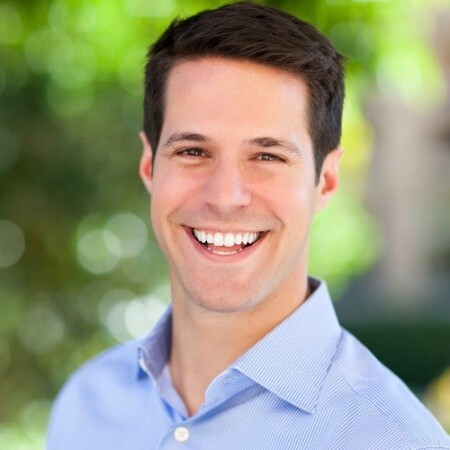
Michael Schwalbe received his Ph.D. in Social Psychology at Stanford University. His research focuses on the psychology of change, how economic disadvantage impacts cognitive functioning, and how theory-driven interventions increase achievement and well-being. Prior to Stanford, Michael worked in the private sector for a decade and earned a B.S. from Cornell University in Policy Analysis and Management and an M.S. from University College London.
PAPER ABSTRACT

Resistance to truth and susceptibility to falsehood threaten democracies around the globe. The present research assesses the magnitude, manifestations, and predictors of these phenomena, while addressing methodological concerns in past research. We conducted a preregistered study with a split-sample design (discovery sample N = 630, validation sample N = 1,100) of U.S. Census-matched online adults. Proponents and opponents of 2020 U.S. presidential candidate Donald Trump were presented with fake and real political headlines ahead of the election. The political concordance of the headlines determined participants’ belief in and intention to share news more than the truth of the headlines. This “concordance-over-truth” bias persisted across education levels, analytic reasoning ability, and partisan groups, with some evidence of a stronger effect among Trump supporters. Resistance to true news was stronger than susceptibility to fake news. The most robust predictors of the bias were participants’ belief in the relative objectivity of their political side, extreme views about Trump, and the extent of their one-sided media consumption. Interestingly, participants stronger in analytic reasoning, measured with the Cognitive Reflection Task, were more accurate in discerning real from fake headlines when accurate conclusions aligned with their ideology. Finally, participants remembered fake headlines more than real ones regardless of the political concordance of the news story. Discussion explores why the concordance-over-truth bias observed in our study is more pronounced than previous research suggests, and examines its causes, consequences, and potential remedies. (PsycInfo Database Record (c) 2024 APA, all rights reserved).
Apple Podcasts – RSS – Simplecast – Amazon Music – Audible – Spotify – Patreon
Why Do We Share Our Feelings With Others?
RELATED EPISODES
YANSS 306 – How to have more productive conversations in a highly partisan, polarized, and politicized world
This episode’s guest is Mónica Guzmán, the author of I Never Thought of It That Way – a book with very practical advice on how to have productive conversations in a polarized political environment via authentic curiosity about where people’s opinions, attitudes, and values come from. In short, it’s about how to reduce polarization and learn from those with whom we disagree by establishing the sort of dynamic in which they will eagerly learn from us as well.
Listen on Apple Listen on Spotify Listen on PatreonRSS – Simplecast – Amazon Music – Audible

— OFFICIAL DESCRIPTION OF THE BOOK–
We think we have the answers, but we need to be asking a lot more questions. Journalist Mónica Guzmán is the loving liberal daughter of Mexican immigrants who voted—twice—for Donald Trump. When the country could no longer see straight across the political divide, Mónica set out to find what was blinding us and discovered the most eye-opening tool we’re not using: our own built-in curiosity.
Partisanship is up, trust is down, and our social media feeds make us sure we’re right and everyone else is ignorant (or worse). But avoiding one another is hurting our relationships and our society. In this timely, personal guide, Mónica, the chief storyteller for the national cross-partisan depolarization organization Braver Angels, takes you to the real front lines of a crisis that threatens to grind America to a halt—broken conversations among confounded people.
She shows you how to overcome the fear and certainty that surround us to finally do what only seems impossible: understand and even learn from people in your life whose whole worldview is different from or even opposed to yours.
Drawing from cross-partisan conversations she’s had, organized, or witnessed everywhere from the echo chambers on social media to the wheat fields in Oregon to raw, unfiltered fights with her own family on election night, Mónica shows how you can put your natural sense of wonder to work for you immediately, finding the answers you need by talking with people—rather than about them—and asking the questions you want, curiously.
Whether you’re left, right, center, or not a fan of labels: If you’re ready to fight back against the confusion, heartbreak, and madness of our dangerously divided times—in your own life, at least—Mónica’s got the tools and fresh, surprising insights to prove that seeing where people are coming from isn’t just possible. It’s easier than you think.
 Mónica Guzmán
Mónica Guzmán Mónica Guzmán is Senior Fellow for Public Practice at Braver Angels, a nonprofit working to depolarize America, founder and CEO of Reclaim Curiosity, an organization working to build a more curious world; and author of I Never Thought Of It That Way: How to Have Fearlessly Curious Conversations in Dangerously Divided Times.
Moni was a 2019 fellow at the Henry M. Jackson Foundation, where she studied social and political division, and a 2016 fellow at the Nieman Foundation for Journalism at Harvard University, where she studied how journalists can better meet the needs of a participatory public. Her work has been featured in The New York Times, the Glenn Beck Podcast, Reader’s Digest, BookTV, and EconTalk, and she is an advisor for Starts With Us and the Generations Over Dinner project.
Before committing to the project of helping people understand each other across the political divide, Mónica cofounded the award-winning Seattle newsletter The Evergrey and led a national network of groundbreaking local newsletters as VP of Local for WhereBy.Us.
She was named one of the 50 most influential women in Seattle, served twice as a juror for the Pulitzer Prizes, and plays a barbarian named Shadrack in her besties’ Dungeons & Dragons campaign.
Apple Podcasts – RSS – Simplecast – Amazon Music – Audible – Spotify – Patreon
YANSS 305 – How to become a supercommunicator (according to science)
Our guest in this episode is Charles Duhigg, a Pulitzer Prize winning journalist and writer for the New Yorker Magazine who is also the New York Times Bestselling author of The Power of Habit and Smarter Faster Better. His new book is Supercommunicators, a practical and approachable guide to what makes great conversations work. We discuss the science behind what it takes to form a connection with another human being, how to generate or nurture a bond through dialogue, and how to form, repair, and maintain a conversational pipeline – through listening and communicating –that guarantees reciprocation and understanding.
Listen on Apple Listen on Spotify Listen on PatreonRSS – Simplecast – Amazon Music – Audible

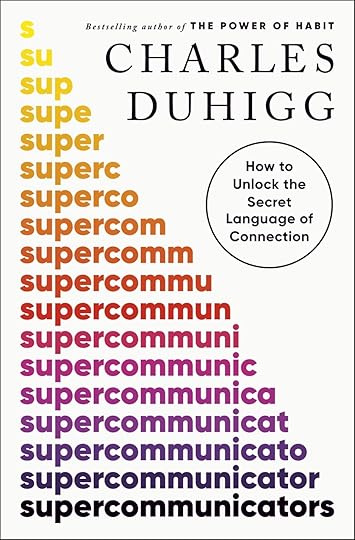
Official Description of the Book:
From the bestselling author of The Power of Habit, a fascinating exploration of what makes conversations work—and how we can all learn to be supercommunicators at work and in life
“A winning combination of stories, studies, and guidance that might well transform the worst communicators you know into some of the best.”—Adam Grant, author of Think Again and Hidden Potential
Come inside a jury room as one juror leads a starkly divided room to consensus. Join a young CIA officer as he recruits a reluctant foreign agent. And sit with an accomplished surgeon as he tries, and fails, to convince yet another cancer patient to opt for the less risky course of treatment. In Supercommunicators, Charles Duhigg blends deep research and his trademark storytelling skills to show how we can all learn to identify and leverage the hidden layers that lurk beneath every conversation.
Communication is a superpower and the best communicators understand that whenever we speak, we’re actually participating in one of three conversations: practical (What’s this really about?), emotional (How do we feel?), and social (Who are we?). If you don’t know what kind of conversation you’re having, you’re unlikely to connect.
Supercommunicators know the importance of recognizing—and then matching—each kind of conversation, and how to hear the complex emotions, subtle negotiations, and deeply held beliefs that color so much of what we say and how we listen. Our experiences, our values, our emotional lives—and how we see ourselves, and others—shape every discussion, from who will pick up the kids to how we want to be treated at work. In this book, you will learn why some people are able to make themselves heard, and to hear others, so clearly.
With his storytelling that takes us from the writers’ room of The Big Bang Theory to the couches of leading marriage counselors, Duhigg shows readers how to recognize these three conversations—and teaches us the tips and skills we need to navigate them more successfully.
In the end, he delivers a simple but powerful lesson: With the right tools, we can connect with anyone.
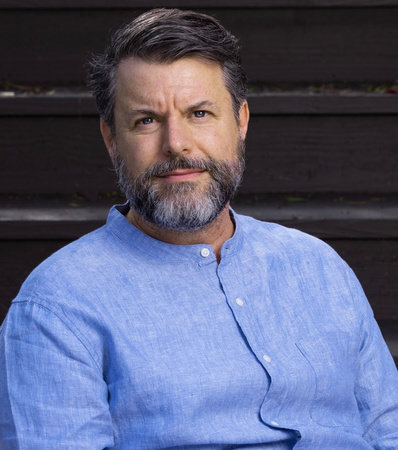
Charles Duhigg is graduate of Yale University and Harvard Business School, Charles has been a frequent contributor to This American Life, NPR, The Colbert Report, PBS’s NewsHour, and Frontline.
Charles led the team that won the 2013 Pulitzer prize in explanatory journalism for “The iEconomy,” a series that examined the global economy through the lens of Apple. That series included examinations of such topics as the factories in China where iPhones and iPads are manufactured.
Charles has also received The George Polk award, the Gerald Loeb award, the Investigative Reporters and Editors Medal, the Scripps Howard National Journalism award, the Robert F. Kennedy Journalism Award, and other honors.
While a reporter at the Los Angeles Times, Charles reported from Iraq about American military operations.
Before becoming a full-time journalist in 2003, Charles worked as an analyst for American Property Global Partners, a private equity firm and co-founded SWPA Education Management Group, L.L.C., which developed education programs for medically underserved areas.
He was also, for one terrifying day in 1999, a bike messenger in San Francisco.
Charles lives in Santa Cruz with his wife and two children.
Links and SourcesApple – RSS – Simplecast – Spotify – Amazon Music – Audible
January 6, 2025
YANSS 304 – How scammers and con artists exploit your psychological vulnerabilities and what you can to protect yourself
In an era in which we have more information available to us than ever before, when claims of “fake news” might themselves be, in fact, fake news, Daniel Simons and Christopher Chabris, authors of The Invisible Gorilla, are back to offer us a vital tool to not only inoculate ourselves against getting infected by misinformation but prevent us from spreading it to others – a new book titled Nobody’s Fool.
Listen on Apple Listen on Spotify Listen on GoogleRSS – Simplecast – Amazon Music – Audible
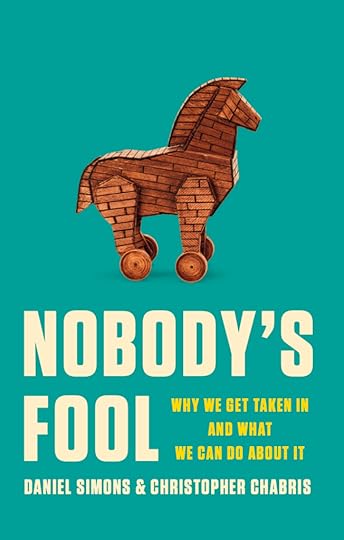
— OFFICIAL DESCRIPTION OF THE BOOK–
From two New York Times-bestselling psychologists, “an engaging master class in how to foil purveyors of false promises” (Philip E. Tetlock, author of Superforecasting)
From phishing scams to Ponzi schemes, fraudulent science to fake art, chess cheaters to crypto hucksters, and marketers to magicians, our world brims with deception. In Nobody’s Fool, psychologists Daniel Simons and Christopher Chabris show us how to avoid being taken in. They describe the key habits of thinking and reasoning that serve us well most of the time but make us vulnerable—like our tendency to accept what we see, stick to our commitments, and overvalue precision and consistency. Each chapter illustrates their new take on the science of deception, describing scams you’ve never heard of and shedding new light on some you have. Simons and Chabris provide memorable maxims and practical tools you can use to spot deception before it’s too late.
Informative, illuminating, and entertaining, Nobody’s Fool will protect us from charlatans in all their forms—and delight us along the way.
It’s no secret that American health care has become too costly and politicized to help everyone. So where do you turn if you can’t afford doctors, or don’t trust them? In this book, Matthew Hongoltz-Hetling examines the growing universe of non-traditional treatments — including some that are really non-traditional.
With costs skyrocketing and anti-science sentiment spreading, the so-called “medical freedom” movement has grown. Now it faces its greatest challenge: going mainstream. In these pages you’ll meet medical freedom advocates including an international leech smuggler, a gold miner-turned health drink salesman who may or may not be from the Andromeda galaxy, and a man who says he can turn people into zombies with aerosol spray. One by one, these alternative healers find customers, then expand and influence, always seeking the one thing that would take their businesses to the next level–the support and approval of the government.
Should the government dictate what is medicine and what isn’t? Can we have public health when disagreements over science are this profound? No, seriously, can you turn people into flesh-eating zombies? If It Sounds Like a Quack asks these critical questions while telling the story of how we got to this improbable moment, and wondering where we go from here. Buckle up for a bumpy ride…unless you’re against seatbelts.
 Dr. Dan Simons
Dr. Dan SimonsDr. Daniel Simons [pronounced: SY-muns] is a professor of psychology at the University of Illinois where he heads the Visual Cognition Laboratory and has courtesy appointments in the Charles H. Sandage Department of Advertising and the Gies College of Business. Dan received his B.A. from Carleton College and his Ph.D. from Cornell University. His research explores the limits of awareness and memory, the reasons why we often are unaware of those limits, and the implications of such limits for our personal and professional lives. For more information, visit dansimons.com.
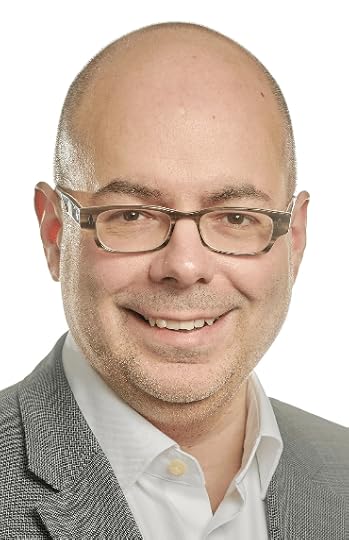 Dr. Christopher Chabris
Dr. Christopher ChabrisDr. Christopher Chabris [pronounced: shuh-BREE] is a cognitive scientist who has taught at Union College and Harvard University and is a Fellow of the Association for Psychological Science. His research focuses on decision-making, attention, intelligence, and behavior genetics. Chris received his Ph.D. in psychology and A.B. in computer science from Harvard University. He is a chess master, poker amateur, and games enthusiast; for three years he wrote the “Game On” column in The Wall Street Journal. For more information, visit chabris.com.
Apple Podcasts – RSS – Simplecast – Amazon Music – Audible – Spotify – Patreon
December 23, 2024
YANSS 303 – What we can learn about perception, priors, and truth itself from the party dress that sparked a global debate over the nature of reality
In this episode we return to The Dress and the psychological lessons offered by one of the most viral moments in the history of the internet via an episode of Decoder Ring in which David McRaney shares some insights from his book, How Minds Change, with Willa Paskin.
Listen on Apple Listen on Spotify Listen on PatreonRSS – Simplecast – Amazon Music – Audible
OFFICIAL DESCRIPTION OF THE EPISODE FROM SLATE:
In the history of viral images, #TheDress has got to be in the top 10. This unassuming photo of a party dress kicked off a global debate when people realized they were seeing it completely differently. Is it black and blue, or white and gold? In today’s episode, we’ll talk to someone who was there when the photo was first taken, and the BuzzFeed writer whose post briefly broke the internet. Then we go down the optical rabbit hole with a neuroscientist who’s been studying the The Dress for years. What does it reveal about the nature of truth?
This podcast was written by Willa Paskin, who produces Decoder Ring with Katie Shepherd. This episode was edited by Andrew Adam Newman. Derek John is Slate’s senior supervising producer of narrative podcasts. Merritt Jacob is senior technical director.
We’ll hear from Paul Jinks, Cates Holderness, Pascal Wallisch, and David McRaney author of the book How Minds Change. Here’s the mentioned in the episode and created by Professor Akiyoshi Kitaoka.
Links and SourcesApple Podcasts – RSS – Simplecast – Amazon Music – Audible – Spotify – Patreon
December 9, 2024
YANSS 302 – How asking the right kinds of questions can lead to innovations, breakthroughs, and discoveries
In this episode we sit down with Warren Berger, the author of A More Beautiful Question – and a man who has made a career out of classifying, categorizing, and making sense of all the many varieties of questions we ask, when we are likely to ask them, and how that can lead to all manner of outcomes, some positive, some negative.
Listen on Apple Listen on Spotify Listen on PatreonRSS – Simplecast – Amazon Music – Audible
OFFICIAL DESCRIPTION OF THE BOOK

We’re all hungry today for better answers. But first, we must learn to ask the right questions.
In his 2014 book, now updated and expanded for 2024’s 10th Anniversary Edition, journalist and innovation expert Warren Berger shows that one of the most powerful forces for igniting change in business and in our daily lives is a simple, under-appreciated tool—one that has been available to us since childhood. Questioning—deeply, imaginatively, “beautifully”—can help us identify and solve problems, come up with game-changing ideas, and pursue fresh opportunities. So why are we often reluctant to ask “Why?”
Berger’s surprising findings reveal that even though children start out asking hundreds of questions a day, questioning “falls off a cliff” as kids enter school. In an education and business culture devised to reward rote answers over challenging inquiry, questioning isn’t encouraged—and, in fact, is sometimes barely tolerated.
And yet, as Berger shows, the most creative, successful people tend to be expert questioners. They’ve mastered the art of inquiry, raising questions no one else is asking—and finding the answers everyone else is seeking. The author takes us inside red-hot businesses like Google, Netflix, IDEO, and Airbnb to show how questioning is baked into their organizational DNA. He also shares dozens of inspiring stories of artists, teachers, entrepreneurs, basement tinkerers, and social activists who changed their lives and the world around them—by starting with a “beautiful question.”
Links and SourcesApple Podcasts – RSS – Simplecast – Amazon Music – Audible – Spotify – Patreon
Carl Sagan on Asking Questions
Neil deGrasse Tyson Explains Why The Sky Is Blue
The Real Reason the Sky is Blue
November 25, 2024
YANSS 301 – How our drive to resolve cognitive dissonance can lead us to change our minds, accept our fates, and become very, very wrong
In this episode, we discuss the landmark 1959 study that popularized the term “cognitive dissonance,” and we dive into the current state of dissonance research with Dr. Sarah Stein Lubrano, a political scientist who studies how cognitive dissonance affects all sorts of political behavior. Lubrano is the co-host of a podcast about activism called What Do We Want? She also wrote a book that’s coming out in May of 2025 titled Don’t Talk About Politics which is about how to discuss politics without necessarily talking about politics.
Listen on Apple Listen on Spotify Listen on PatreonRSS – Simplecast – Amazon Music – Audible
In episode one of this series, we spent time with the scientists who infiltrated a doomsday cult that predicted the exact date and circumstances of the end of the world, and when that date passed and the circumstances did not occur, instead of saying, “Oh, I guess we were wrong about that,” they found a way to keep believing and grow more fervent in their devotion.
We established that when you notice you’ve done something that you believe is wrong, you will either stop doing that thing or stop believing it is wrong. And if you come across information that disconfirms one of your beliefs, you’ll either change that belief, challenge the validity of the challenging information, or go looking for some information that suggests no, in fact, you are totally right.
In this episode, we take a deep dive into the nature of dissonance theory and explore just why it is that humans are compelled to return to a state of consistency when we notice two beliefs, two behaviors, or a belief and a behavior are inconsistent. We explore why this form of error detection usually keeps us stable and correct and properly oriented, but when the conditions are just right, our efforts to see ourselves as right and proper and decent can lead us to become more wrong, not less – factually, morally, and otherwise.
Links and SourcesApple Podcasts – RSS – Simplecast – Amazon Music – Audible – Spotify – Patreon
Sarah Stein Lubrano’s Substack
Cognitive Consequences of Forced Compliance (the original study)
Cognitive Dissonance MetaStudy
Cognitive Dissonance Theory After 70 Years
YANSS 301 – How our struggle to resolve cognitive dissonance can make us more wrong, not less, and less moral not more
In this episode, we discuss the landmark 1959 study that popularized the term “cognitive dissonance,” and we dive into the current state of dissonance research with Dr. Sarah Stein Lubrano, a political scientist who studies how cognitive dissonance affects all sorts of political behavior. Lubrano is the co-host of a podcast about activism called What Do We Want? She also wrote a book that’s coming out in May of 2025 titled Don’t Talk About Politics which is about how to discuss politics without necessarily talking about politics.
Listen on Apple Listen on Spotify Listen on PatreonRSS – Simplecast – Amazon Music – Audible
In episode one of this series, we spent time with the scientists who infiltrated a doomsday cult that predicted the exact date and circumstances of the end of the world, and when that date passed and the circumstances did not occur, instead of saying, “Oh, I guess we were wrong about that,” they found a way to keep believing and grow more fervent in their devotion.
We established that when you notice you’ve done something that you believe is wrong, you will either stop doing that thing or stop believing it is wrong. And if you come across information that disconfirms one of your beliefs, you’ll either change that belief, challenge the validity of the challenging information, or go looking for some information that suggests no, in fact, you are totally right.
In this episode, we take a deep dive into the nature of dissonance theory and explore just why it is that humans are compelled to return to a state of consistency when we notice two beliefs, two behaviors, or a belief and a behavior are inconsistent. We explore why this form of error detection usually keeps us stable and correct and properly oriented, but when the conditions are just right, our efforts to see ourselves as right and proper and decent can lead us to become more wrong, not less – factually, morally, and otherwise.
Links and SourcesApple Podcasts – RSS – Simplecast – Amazon Music – Audible – Spotify – Patreon
David McRaney's Blog
- David McRaney's profile
- 582 followers



